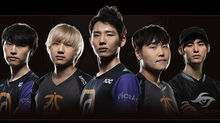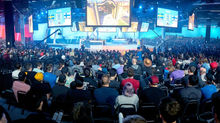How 'League of Legends' can shape the future of eSports
- Play4Win
- Jul 6, 2017
- 3 min read

League of Legends is a driving force of the eSports industry. With more than 100 million players around the world and tournaments that regularly sell out stadiums including the Staples Center and Madison Square Garden, Leaguerepresents the epitome of mainstream professional gaming. League sets the eSports standard.
That's one reason it was such a big deal when Riot Games announced massive changes coming to the North American League of LegendsChampionship Series, which decides the team competing in the World Championship every year. The new rules are designed to give North American players and franchises more security, more money, and more input in league decisions. After about a month to absorb the new regulations, we spoke with leaders and coaches of three major League of Legends teams -- Immortals, Team Dignitas and Team Liquid -- about what this means for the future of professional play.
But, first, the new rules. There are three layers of changes heading to the North American LCS: structural, financial and communicative.

Let's start with structure. Currently, all LCS teams face the possibility of relegation -- being kicked out of the league entirely if they don't perform well throughout the season. Starting in 2018, the North American LCS will feature a lineup of permanent teams, all of which must meet Riot's criteria for player support and brand management. Additionally, the almost-pro Challenger Series will become the Academy League, a true proving ground for fresh talent.
Permanence not only gives LCS players and coaches more stability, but it allows investors to funnel more money into the market, secure in the knowledge their teams won't suddenly disappear from the league. Plus, Riot will be better able to ensure players -- some of whom get their start while still in high school -- aren't exploited.
"Part of our evaluation process will be examining how teams will support their pros, not only in coaching and training, but in career opportunities or higher education once their playing career has ended," Riot says.

Some of that support comes in the form of money, which brings us to the second layer of changes. The minimum salary for LCS players in 2018 is $75,000, up from the current floor of roughly $25,000. Plus, professional players as a group are now guaranteed to earn at least 35 percent of league revenue. At the end of the season, if the total of all players' salaries is less than 35 percent of LCS revenue overall, the difference will be distributed directly to the players, on top of their guaranteed salaries.
These moves are necessary to keep up with naturally occurring standards: The average salary of a North American LCS player is about $105,385, according to a January ESPN poll.
Additionally, LCS teams will be required to pour some of the money they make from sponsorships and merchandise sales back into the league, while Riot will similarly share revenue from media deals, in-game sales and other avenues. The studio laid out some of these details in September. Teams in 2018 are also guaranteed 32.5 percent of league revenue, half of that distributed based on where they place, and how they contribute to fan engagement and viewership.

The final change is all about the players. Riot is laying the foundation for a formal Players' Association, providing financial support to launch the organization but allowing members to vote in their own representatives. The association is designed to give players a direct line of communication with Riot, plus it will house resources such as skills training, financial planning and legal aid. The Players' Association is set to go live this year.
Until now, professional gaming in western countries has existed in a largely unregulated void, without guarantees for the safety of players or the success of any league. The new North American LCS rules may be niche, but they're ripe to be imitated throughout the eSports world -- potentially affecting games like Dota 2, Counter-Strike: Global Offensive and Overwatch.
On a global scale, the new structure might help the North American League of Legends scene catch up with countries like South Korea, where top players are treated more like football stars (pigskin or otherwise) and the government itself supports the eSports industry. South Korea happens to dominate the League of Legends World Championship every year: There have been six tournaments since 2011, and the most recent four have been won by South Korean squads -- three by the same team, SK Telecom T1.
Meanwhile, there's no official regulatory body for eSports in the US, meaning players and leagues are figuring it out as they go along. Global groups like the Professional eSports Association and the World eSports Association are attempting to set standards and ensure players aren't treated unfairly, but they're in their infancy.
The North American LCS represents an exciting test of eSports' potential in the western world, treating League of Legends with the seriousness of a traditional sport.
Read More : Engadget













































Comments